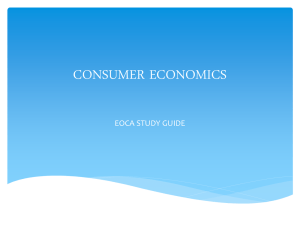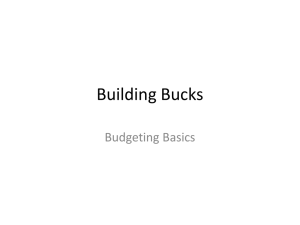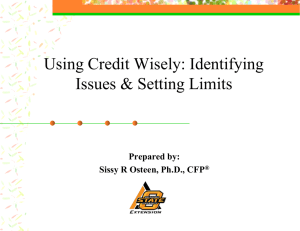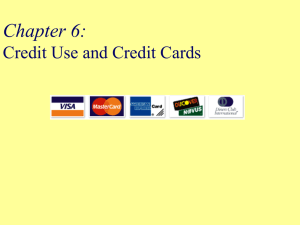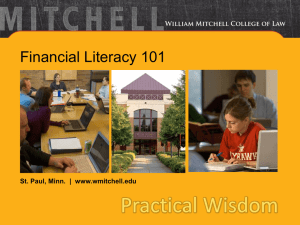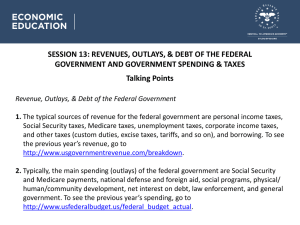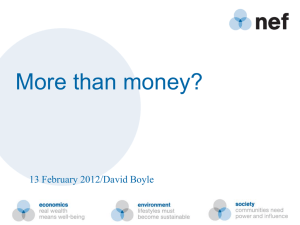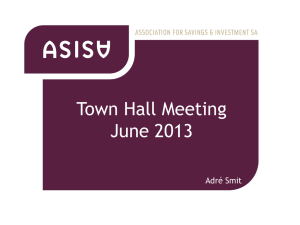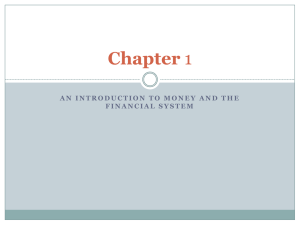Time & Money
advertisement
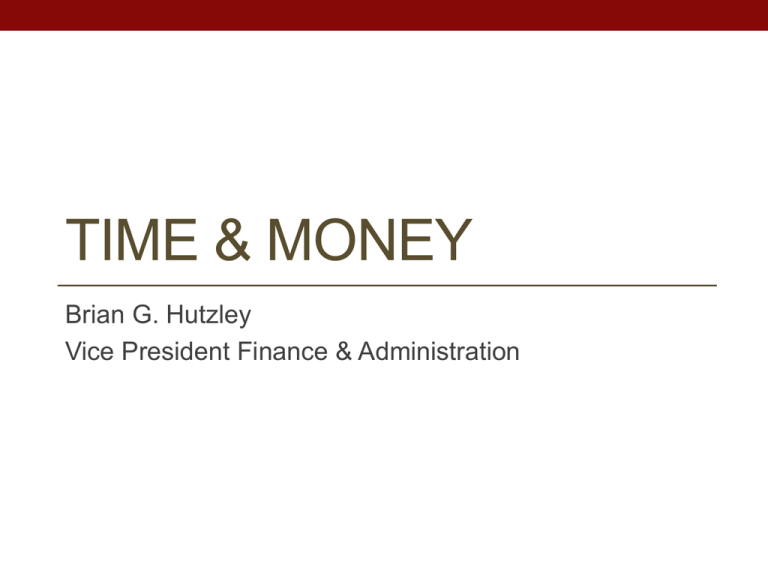
TIME & MONEY Brian G. Hutzley Vice President Finance & Administration TIME & MONEY • Credit Cards • Debt • Budgets • Savings Credit Cards • Many advantages • Convenience - buy needed items now • Security of not having to carry cash. • Fraud protection • Rewards for making purchases. • With these advantages also come responsibilities. Credit Cards • You need to manage credit cards wisely by understanding all of the card's terms and conditions; • stay on top of payments; and realize the true cost of purchases made with credit. • Using a credit card is like taking out a loan. • If you don't pay your card balance in full each month, you'll pay interest on that loan. Choose Wisely The best way to maximize the benefits of credit cards is to understand your financial lifestyle - your money needs and wants. Once you determine how you'll use a credit card, it's important to understand all of the card's features including: • Annual Percentage Rates (APRs) and whether rates are fixed or variable • Annual, late and over-limit fees • Credit limit on account • Grace periods before interest begins accruing • Rewards including airline miles or cash back Stay Alert • Some credit card issuers offer free, personalized and automatic alert messages to your phone and email to help you keep track of: • Available credit • Balances • Payment due dates • Payment histories • Purchase activity Understand Your Rights Credit cardholders are entitled to protections: • Zero liability means you are not responsible for fraudulent charges when you report them promptly. • In some cases, you have the right to dispute purchases with merchants for unsatisfactory products or services. Credit Pros and Cons Advantages Immediate Access: Need a new set of tires? Credit can help with an expensive, unexpected emergency and give you the flexibility to pay it over time. Security: Lose cash, and it's gone. Lose a credit card, and it can be cancelled. Also, if you report a lost or stolen card promptly, you're protected against its unauthorized use. Record Keeping: Your credit card statement is an itemized list of your monthly expenditures, which can be helpful when it comes to budgeting. Convenience: Credit cards are accepted at more places than checks, and they're generally faster to use. Bill Consolidation: Bills can be paid automatically via credit card, consolidating several payments into a single lump sum. Rewards: Using a credit card with a rewards program may earn you benefits like free travel Credit Pros and Cons Disadvantages • The main disadvantage to credit card usage is its cost to you in interest and fees. • Wise use of credit means understanding those costs and acting accordingly. • Keep track of your spending to ensure that you can repay your credit card bill in full when it comes due each month. Debt If you’re in debt, you’re not alone. • Consumer debt in America is extraordinarily high. • Sometimes it’s hard to know – or admit – if you have a problem with debt. It can be overwhelming to realize that you’ve gotten in over your head, and to worry that you won’t be able to pay back what you owe. • The key to getting out of your situation is to act now. Don’t procrastinate. Taking charge of your finances and creating a plan for tackling your debt will cut down your anxiety and get you on the path toward a better financial future. First, ask yourself whether debt has become a problem for you. Here are some circumstances that might indicate it has: • Next month’s bills arrive before last month’s have been paid • Your bills often include late fees • You avoid opening bills when they arrive in the mail • You procrastinate balancing checkbooks • You bounce checks Debt - Write it Out Do you actually know how much debt you have? Many people don’t. Start by making a list of everything you owe, whether it’s a mortgage, a credit card balance, student loans or even money you borrowed from family or friends. Write down: • The lender’s name • The amount you owe • The term of the loan • The interest rate and fees Then total them up. Looking at the numbers can be worrisome, but this is a positive – and necessary – first step to tackling your debt. Debt - The power of 50 • Paying the minimum amount due on your credit cards is one of the fastest ways to fall further into debt, and it can keep you in debt for years or decades. • If you have a credit card with a $3,000 balance at an annual interest rate of 18%, and you pay only the 2% minimum monthly payment of $60 per month, it would take you 8 years to pay off your bill. Not only that, you will have paid $5,780 by the end of the 8 years – almost double the $3,000 you thought you were spending when you made the charges. • Paying just $50 above the minimum amount due each month will make an incredible difference in how quickly you can pay down what you owe. If you pay an additional $50 per month toward your $3,000 balance for a total payment of $110 a month, you could pay off the debt in 3 years instead of 8, and save yourself over $1,800 in interest. Imagine what you could do with $100 more per month. Be realistic • Now that you have analyzed your debt situation, it’s time to look at your monthly budget and set realistic goals. • Trip you had planned for next summer? • New car ? Buying a Car Take the car buying process one step at a time and put some time into researching your purchase and your finances before you stop on the lot, the process is likely to go a lot more smoothly. • What Can You Afford? Before you begin shopping for a car, it's important to take a look at your budget and figure out how much you can afford to spend on a vehicle, without strapping yourself or cutting into your savings. That number will be the total amount that you can pay for the car itself and operating expenses, like gas and maintenance. • Operating expenses can be about one third to one half of the monthly cost of a new car. So take the amount you've decided you can spend on your car each month and multiply it by .66. That is the most you should consider spending on monthly payments for the vehicle to be able to afford operating expenses as well. • The Down Payment You're also going to need a big chunk of change for a down payment. How much? The bigger the better. To get a loan for a car, and often for a lease, you'll probably need to make a down payment of around 10% of the total price of the vehicle. The larger your down payment, the smaller your monthly payment will be and the less you will pay in total for the car in the long run. But make sure you don't cripple yourself or deplete your savings account with too large a down payment. Find a comfortable balance. Saving & Spending • In today's economy, it's hard enough to keep up with the bills, let alone save money. • Many Americans are finding it difficult to do everything they would like and deserve to do with their money. • Learning how to develop a budget and discovering the options available to you will help you prioritize saving and achieve your financial goals. Saving & Spending • Savings can help you achieve any financial goal. Whether it’s a • • • • • comfortable retirement, a down payment for a house, or a new car, you can get there by setting money aside. And best of all, you can have what you want without getting bogged down in debt. Most people, you don’t save as much as you’d like to. Or you don’t save at all. Americans spend more than we earn. Consider that the national personal savings rate has dipped to the lowest point since the Great Depression. Today’s high energy, home and food prices may make saving seem less possible than ever. But the time is now. And with a little forethought and effort, saving money is not only possible, it’s easy. Make Saving a Priority • You’ll be more likely to save money if you make it a priority. Sit down and figure out what you’d like to save money for – retirement, a house, car, college, dream vacation –and how much it will cost. Then make your plan: • Set a timeline for when you’d like to reach your goal. • Set a schedule by dividing the total goal amount by the number of weeks, months or pay periods between now and your goal date. • Be vigilant by treating your savings contribution just like any other must-pay expense, such as rent or groceries. Find Money to Save • While it may seem difficult sometimes just to make ends meet, chances are you have extra money you didn’t even know about. Here are some ways to find it: • Keep track of everything you spend for a week. You might be surprised • • • • what you’re buying, and what you can do without. Make purchases with cash. This can help you stick to a budget and avoid impulse purchases. Simply decide ahead of time how much you want to spend and then set aside that amount in cash before you go shopping. Lower your bills. Many creditors will give borrowers a lower interest rate if they’re asked. Also, conserving electricity and gas can make a big difference. Rank your nonessential expenses. Keep the ones you like the best and cut the items on the bottom of the list. Pack a lunch. Or cook more dinners at home. Eating out at restaurants can eat up a lot of money that could be saved. Budget • A budget is a plan for your future income and expenditures that you can use as a guideline for spending and saving. • Although many Americans already use a budget to plan their spending, the majority of Americans also routinely spend more than they can afford. • The key to spending within your means is to know your expenses and to spend less than you make. A good monthly budget can help ensure you pay your bills on time, have funds to cover unexpected emergencies, and reach your financial goals. • Most of the information you need is already at your fingertips. Budget 1. Add Up Your Income To set a monthly budget, you first need to determine how much income you have. Make sure you include all sources of income such as salaries, interest, pension and any other income–including a spouse's income if you're married. • If you get a salary, be sure to use your take-home pay rather than your gross pay. Taxes are usually taken out automatically, but if they're not, remember to include them as another expense. Budget 2. Estimate Expenses The best way to do this is to keep track of how much you spend for one month. • You have fixed and flexible expenses. • Fixed expenses are those that generally do not change from month to month, such as rent and insurance payments. • Flexible expenses are those that do change from month to month, such as food or entertainment. • If some of your expenses for one or more categories change significantly each month, take a three-month average for your total. Budget 3. Figure Out The Difference Once you've totaled up your monthly income and your monthly expenses, subtract the expense total from the income total to get the difference. A positive number indicates that you're spending less than you earn--congratulations. A negative number indicates that your expenses are greater than your income. This means you will need to trim your expenses in order to begin living within your means. Checking Account Here are a few things to consider before you open a checking account: • Location. Does the financial institution have branches in the areas where you work and live? • Availability of ATMs. The ATMs owned by your bank won’t charge you to withdraw cash, but other banks’ ATMs will. Does the financial institution have machines in locations that are convenient for you? • Hours. Do you work during the day? Perhaps you need a financial institution with extended hours’some are even open on Sundays. • Customer service. Do their customer service offerings fit your needs? • Online banking. The Internet has made it very convenient to keep track of your finances online. Find out if the institution you’re considering provides online access to your account. • Banks & Credit Unions Many serve as one-stop financial service shops. In addition to checking and savings accounts and credit cards, here are some services and products offered by most financial institutions: Credit cards Lines of credit Personal, business and auto loans Mortgages Online or mobile banking Automatic bill pay International banking Health savings accounts Financial planning Investment management Health, home and car insurance Retirement programs Balancing your Checkbook The best way to avoid fees and penalties on your checking account is by making sure that you correctly balance it each month. A balanced account means simply that the tally of deposits and purchases you've made matches up with your monthly statement. It sounds challenging, but it’s really easy. • Step 1: Get a copy of your monthly bank statement. These should be mailed to you each month, but if you misplace one you can ask for another (usually for a fee) or get a copy online (usually for free). • Step 2: Compare your statement to your checkbook register. Throughout the month, you should have been recording every deposit and purchase or withdrawal. If you see any charges or deposits on your statement that aren’t in your register, add them. • Step 3: Record any fees or balance adjustments that may appear in your statement. • Step 4: Subtract from your register’s balance any checks you have written but that have not yet cleared the banking system. • Step 5: Check and see if the total matches your statement. If it does, your account is balanced. If not, go back through your register and see if you’ve missed anything or if you’ve made a mistake with your math. Software Apps • An even easier way to balance your checking account is to use financial management software, such as Quicken. • You can record your purchases into the program as you make them. • Then, when your bank statement arrives, you can run a program that will walk you through the process of balancing your account. Banking Bounced checks • Everybody makes mistakes from time to time. When you make mistakes on your checking account register it can result in overdrafts, also known as bounced checks. This is when you write a check for which you lack the money in your account to cover. • Overdraft fees on bounced checks can be very costly, with most banks charging $25 to $35 for each one. It’s not unusual for someone to miscalculate and bounce a number of checks in a row. Note that the new law limiting the overdraft fees customers can be charged applies only to ATM withdrawals and debit card purchases, and not to checks. Fortunately, there are some remedies when this happens. • Overdraft protection. Most banks will offer a line of credit that will kick in when you make a charge that exceeds your balance. These are like credit card charges, with interest, so be sure to pay them off as soon as you can. • Negotiate. Sometimes a bank will waive an overdraft fee when asked. They usually do so only if the overdraft was a rare occurrence. In other words, if you have a habit of bouncing checks, they’re not likely to cut you a break. Online Banking Online banking allows you to automate a lot of your financial transactions. • Automatic Deposit. You can have your paycheck automatically deposited into your account. Ask your employer if this service is available where you work. It's a good idea, because you won't have to wait in line at the bank every time you get paid. • Automatic Bill Pay. You can have your bank make automatic contributions to certain bills if you wish. Also, your bill collectors likely offer the service. Many prefer this method and will sometimes offer a cost break if you choose to use it. This can be a great convenience, but be careful. If your cash flow is sporadic, an automatic payment could kick in when you don't have enough funds, causing you to be penalized. Note that the new law limiting overdraft fees customers can be charged applies only to ATM withdrawals and debit card purchases, and not to automatic payments. • Automatic Transfer. If you're trying to maintain a savings regimen, consider having a certain amount of your paycheck or checking account balance transferred into savings or an investment fund. It's easy to set up either online or at your local branch. • Automate Your Records. Many online banking services are compatible with financial management software. You can have your account records imported regularly, and make balancing your checkbook quick and easy. • Bank From Anywhere. With online banking, you can pay your bills and manage your accounts while at home in your pajamas. Or you can do it from anywhere in the world. Wherever you have an Internet connection, you have the ability to work with your money. Paying Student Loans • Exit Interview If you have taken student loans, your school is required by law to give you an exit interview. This is simply a time to meet with a financial aid advisor to discuss your repayment obligations and options. Make sure not to miss the opportunity. • Grace Periods Because most college students don't get jobs immediately after graduation, lenders usually offer a grace period of about six months before you need to start repaying your student loans. Take time during your grace period to organize your finances and evaluate your options. Repayment Options There are many different ways you can arrange your payment schedule, depending on what you can afford: • The standard payment plan, if you can afford it, will offer you the lowest total loan cost. • A graduated payment plan will start you out with lower payments that increase as time goes on. • With income-related payment plans, your monthly payment amounts are tied directly to your income instead of rising gradually no matter what your income. • Extended repayment allows you to make smaller payments for a much longer period of time. Employer Provided Benefits • Whether you've just started a new job or you've been with the same company for years, you need to make sure you're maximizing your employee benefits. • Most employers offer a host of company-sponsored benefits. Often, the combined value of these coverages is worth a third or more of your base pay. That's too much money to leave on the table. And some employee benefits have valuable tax advantages you can't afford to ignore. • If your employer provides a 401(k) plan or Health Care and Dependent Care Flexible Spending Accounts (FSAs) and you're not participating, you could be missing out on hundreds or thousands - of dollars in tax savings each year. That's money that goes right into your pocket instead of Uncle Sam's. What is a 401(k) plan? • Many employers sponsor a retirement savings plan for their employees. • Under these plans, also commonly known as defined contribution plans, you can save money toward your retirement on a tax-deferred basis – that is, you don't pay federal or state income taxes on your savings or their investment earnings until you withdraw the money at retirement. • Most people's taxable income – and therefore, their tax rate – is lower at retirement than during employment, so they end up paying considerably less in taxes on their savings. • These plans have many features in common, although contribution limits, vesting schedules for employer-matching contributions, investment options and other details may differ, so be sure to read the plan documents for your particular plan carefully. How do 401(k) Plans Work? • With a regular 401(k) plan, money is deducted from your paycheck before taxes are withdrawn, which lowers your taxable income and therefore, lowers your taxes. • Some plans allow you to contribute money on an after-tax basis as well. Check with your financial advisor for cases when this might be advantageous in your situation. • In addition, many employers have begun offering Roth 401(k) plans, which combine the features of a regular 401(k) with those of a Roth IRA. With a Roth 401(k) you contribute after-tax dollars. Although you don't get an upfront tax break, your account grows tax-free and withdrawals aren't later taxed, provided you’ve had the account at least five years and are age 59 ½ or older – or have become disabled or die. Employer Matching Contributions • Although not required to by law, many employers match a portion of the contributions employees make to their 401(k) account. • These matching contribution amounts vary widely from employer to employer (usually from 25 percent to 100 percent of your contributions, up to a set percentage of your pay). • In addition, some employers will increase their match based on your years of service. Questions ???
